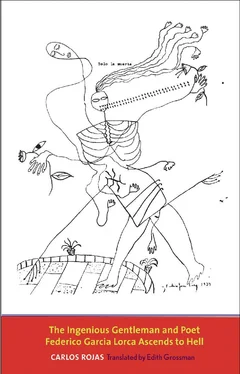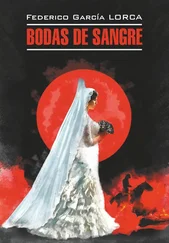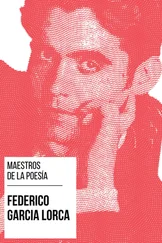With greater calm, almost with the cold curiosity an agnostic scientist would bring to the examination of a frog’s heart, which he had compared to God Himself in his homage to Falla or, to be more precise, at a crossroads of his irrevocable destiny, he held the gaze of the stranger and in spite of himself began to observe him.
He was an old man of indefinite age, impossible to determine, with the ambiguous air of those who stopped aging one day in their senescence. Perhaps on the anniversary of their coming into the world, or maybe at the funeral of one of their grandchildren, or possibly one morning when they woke, as they contemplated the still bluish sun of dawn and wondered whether that light and that silence might not be the only reality before which our lives passed like the images of a film moving across the back curtain of the stage. The man was also shorter than he, though at one time he may have been taller before age bent him and made him shrink. His head was completely bald from temple to temple, as rosy as a child’s above his forehead and mottled with dark spots at the temples. His eyebrows above the edge of rimless glasses with very long earpieces of thin gold were hairy, thick, and white. He dressed in black, with no affectation or untidiness, as if he simply wore mourning for himself.
For a lost instant, one of those moments that even in hell seem fleetingly suspended over the edge of a knife, he felt the temptation to touch the old man’s hand or forearm. Immediately another impulse, more complicated and difficult to explain, held him back. Almost at the same time he told himself the intruder would disappear when touched, just as his represented memories vanished when he persisted in going up on stage to put his hands on them. He also thought that knowing the stranger was alive on the spiral, old but still animate and fragile, would be the greatest of horrors when at the back of his mind he still hoped he was nothing but an apparition of his own aberration. (WHY DON’T YOU PRETEND YOU’RE CRAZY AND BE ACQUITTED?) Then, almost without realizing it and as if he had lost control of his voice, he asked:
“What are you doing here?”
“Where am I?” he replied as if he hadn’t heard him.
It was all too absurd, as Bebé and Carlillo Morla would say, shaking their southern, Chilean heads when he read them one of his surrealist pieces. He was afraid to experience when dead a passage added to his play, The Public , which he had entrusted to Rafael Martínez Nadal. (“If something should happen to me in this war that’s at our door, swear to me you’ll destroy the original of The Public right away.”) In a brief rush of author’s passion, over which the doors of hell or death did not prevail, he asked himself whether Rafael had carried out that request and replied he’d never have the courage to do it, just as he had expected when he handed him the manuscript. (“Precisely for that reason, because only I could suspect the importance of what I’ve written. If I die, The Public has no reason to be for other people.”) His words back then seemed grandiloquent and pretentious. But he couldn’t help identifying with one of his own mad characters in that farce, The Figure of Bell, The Centurion, The Prompter, or The Lady, when he insisted, facing the stranger:
“Do you really not know where you are?”
“No, I don’t know. But I’ve come from hell.”
He shook his bare head, too big for the shoulders reduced by age. When he moved it, it seemed ready to separate from his hunched body, and the vertebrae in his neck creaked with the sound of little bones being stepped on.
“This is hell,” he replied in a tone of anger transformed into studied indifference. Without knowing why he began to hate the intruder. He was overcome by a dark rancor toward his voice and his astonished gaze beneath ashen eyebrows.
“This is hell?”
“Yes, yes it is, and it has the form of a spiral. Each dead person is assigned a theater, and this is mine. What are you doing here?”
“Your theater?” the old man asked in a tone of amazement. “What do you mean?”
Consternation opened the stranger’s eyes wide behind the round lenses of his glasses. He told himself that in the past, in another world lost in a very remote time, his eyes had been large and dark. He didn’t know then whether he remembered the other man’s eyes or supposed he ought to remember him without being able to specify who he was. The old man’s accent eventually disconcerted him, because free of intonation and inflections, in the end it disappeared. It made him think of a Trappist who, returned to the world after eternities in silence, spoke as if he had learned the language of his fellow men in the midst of a species other than human. In turn, and to his own annoyance, he caught himself speaking to the man in mourning in the tranquil, slow tone of someone who insists on proving the veracity of his words before the most cynical of deaf men or the most skeptical of judges.
“On stage my memories are revived when I evoke them. Only mine, though other dead people invisible to me must see them as well, as I sometime look at theirs in other theaters. If one of us is acquitted at trial, he obtains the grace of sleep freed from consciousness and memories. At other times, I believe that men’s evocations precede their death and their presence in hell … ”
He was cut off by the old man’s laughter. It seemed uncontrollable, though he soon took delight in his own outburst. He laughed as if he were clucking, out of breath and trembling. Behind his toothless gums was the dark palate of a sheep dog.
“Where did you get this absurd idea of hell turned into a tower of theaters?”
“It’s not a tower. It’s a spiral. All you have to do is go out to the corridor to understand. The passageway climbs in very wide, open curves to all the theaters.”
“A spiral!” Hilarity doubled the old man over as if he were a hook. It made him slap his knees with bony hands spotted by the years. “It’s the most grotesque thing anyone could imagine! Hell a spiral of theaters. One for each man, I suppose.”
“One for each man,” he agreed, more and more humiliated and surprised, incapable of escaping from the phantom and even of ignoring his unexpected presence. “One for each dead person.”
The apparition shook his head and for the first time looked away. His guffaws turned into panting with the coughs and snorts of an old rutting stag, though he soon gained control of himself. He spoke now with a kind of ironic commiseration, as an experienced and to a certain extent sadistic shepherd would with a very young apprentice goatherd.
“Boy, this isn’t hell and we aren’t dead. I’m very well acquainted with hell, to my sorrow, and I can assure you it’s on earth.” He turned to face him, as if trying to convince him with his sincerity after abusing him with his sarcasm. “Do you know where we really are?”
“Where do you want me to say?”
“I haven’t wanted anything, my boy, not even to go on living, for a very long time. But facts are facts, even though they may be dreams. This supposed spiral of hell, these theaters where, as you so absurdly say, their memories at times precede the dead, the other stage set of your ridiculous vocations, the eternal sentence to wakefulness and memories, the possible liberation in forgetting, all of it, absolutely all of it, is nothing more or less than my nightmare. You’re not anyone, only a crazed phantom in one of my dreams, from which I’ll wake whenever I please.”
(WHY DON’T YOU PRETEND YOU’RE CRAZY AND BE ACQUITTED?) The crazy one was that man, whoever he was, placed in his path by an inexplicable but perhaps not completely irrational destiny as he prepared, or should have prepared, for his trial. If that withered creature was truly mad and not simulating derangement, perhaps the purpose of an oblique providence was to offer him as a model for his own feigned madness. On the other hand, the man believed both he and hell were his dream, the nightmare of a possible megalomaniac who perhaps feared being immortal. (“I haven’t wanted anything, my boy, not even to go on living, for a very long time”), but Sandro Vasari had also dreamed the endless spiral, him in his assigned theater, and even some of the memories that preceded Vasari himself into eternity. One by one, the words of the man with the plastered-down hair and the scar on his cheek came back to him: “I said to myself: This can’t be, dreaming you went crazy. And then: Dreaming you went to hell. Parts of that nightmare, perhaps the most terrible ones, disappeared upon waking.”
Читать дальше












